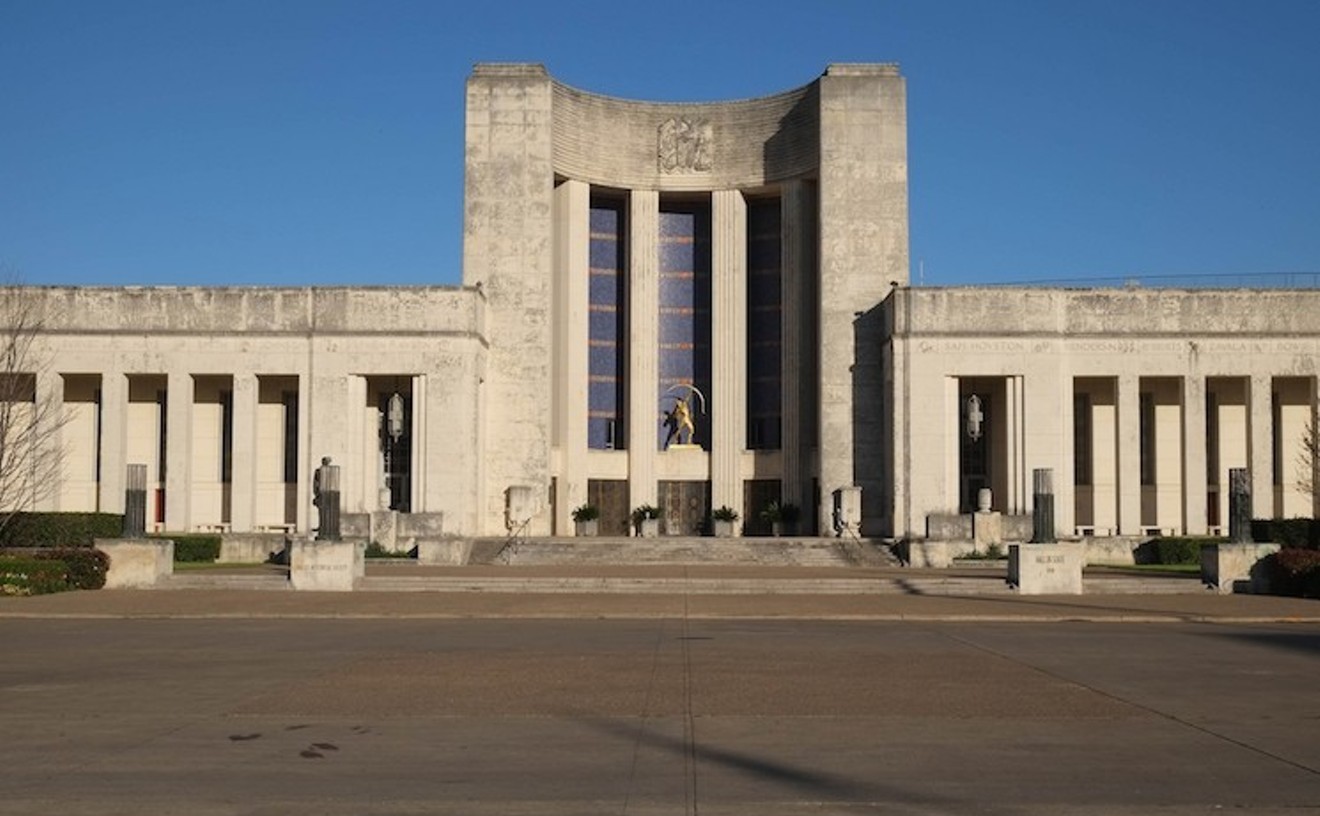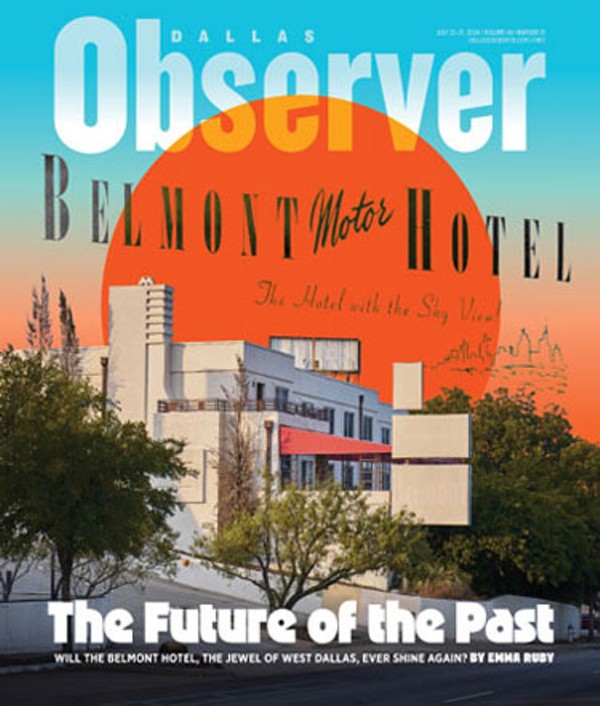The deal was all but done. Under a plan pushed by Mayor Mike Rawlings, the City Council looked set to hand over management of Fair Park, home of the State Fair of Texas and one of the largest collections of decrepit Art Deco buildings in the country, to a private entity led by the mayor's pal, Walt Humann, along with $20 million a year in city money to Humann's group, the Fair Park Foundation. Dallas was between city attorneys at the time, and the interim city attorney signed off on the deal. Then two things happened: Dallas got a new city attorney, Larry Casto, and mayoral adversary, lawyer and all-around sweet guy, City Councilman Philip Kingston, asked a question. Can the city really just hand over a major hunk of city property without seeking competitive bids? Casto had an answer — and a pair of big ones, considering the way City Hall works: No, it can't. The city has to put out a request for proposals for bidders if it wants to hand management of the 277 acres of city property over to a private entity. That opens the door for other groups to bring fresh ideas for rebuilding the park in a way that might help lift the blighted South Dallas neighborhood around it. If that happens, and that's a pretty big if, whichever group wins the bid can erect a small bronze plaque commemorating Larry Casto in some corner of the park.
Best Rebellion
Dallas Joins Texas Communities Fighting Sanctuary Cities Law

Odd thing about the Texas GOP: It's all for small government and local control except when its philosophy runs up against one simple fact. Texas' largest urban areas tend to be Democratic strongholds. They also tend to have sizable populations of Latinos. So when Senate Bill 4 came up before this year's legislative session, the party faced a philosophical conundrum. Can right-thinking Republicans support a bill that threatens criminal penalties for local officials who refuse to act as federal proxies in enforcing immigration law? You bet they can. When it comes to immigrant-bashing, there's no low that the party of Donald Trump won't sink to. Under SB 4, local sheriffs and police chiefs are forbidden from adopting any policy that might hinder the enforcement of federal immigration laws, even if that means local immigrant communities are less likely to turn to the police when they're victims of crime for fear of being deported. Texas' major cities aren't taking that lying down. Dallas joined Houston, San Antonio, Austin and other communities in a federal lawsuit challenging the bill, which means that eventually a federal court will determine for Texas whether its state government can order local government to act as proxies for the federal government. The word you're looking for, by the way, is "hypocrites."
Best State Representative
Rafael Anchia

During what was otherwise a desultory session of the Texas Legislature, several Dallas reps stood out by sticking up for their city. Freshman Victoria Neave repeatedly stood up for women and immigrants. Eric Johnson, West Dallas' rising star, worked hard for criminal justice reform and proposed innovative solutions to smooth out the effect of gentrification in his neighborhood. In a session notorious for its ugliness toward Texas' immigrant community, however, Rafael Anchia's voice was essential. Anchia, head of the Mexican American Legislative Caucus, couldn't stop Senate Bill 4, Texas' sanctuary cities bill, but he made sure those who fought for it couldn't do so in the dark, calling out the bill for cranking up the fear in Latino communities around the state and turning Texas cops into immigration officers. If Texas' demographics ever prove to be destiny, Anchia will be a progressively more powerful figure as the state gets bluer.

When newly elected President Donald Trump announced he was banning travelers from seven Middle Eastern countries, effective immediately, at the beginning of January, sympathetic North Texans flocked to D/FW Airport to show their support for those who might be stuck there, as well as those who might be arriving from one of the banned countries. Lawyers helped stranded travelers free of charge, and Dallas Mayor Mike Rawlings and Dallas County Judge Clay Jenkins showed up to take a stand with the immigrants and against Trump. Eventually, thanks to help of a couple of court orders, those detained were released and reunited with their loved ones. During the first domestic crisis of the Trump administration, Dallas stood up.
Best Petty Fight
Glenn Beck and Tomi Lahren

Glenn Beck and Tomi Lahren deserve each other. That's what made it so sad when the two right-wing yakkers, thrown together at Beck's The Blaze, went through such an acrimonious divorce earlier this year. The Blaze froze Lahren out after she went on The View and told the world that, as a civil libertarian, she was pro-choice. Lahren sued the network for wrongful termination. Beck fired back that Lahren was a nightmare to deal with on staff and that she hadn't been fired; she just wasn't going on the air anymore. Eventually, the parties settled. Lahren got her Facebook page back, and Beck got Lahren off his network for good. The Blaze is getting along just fine in Lahren's absence, and Lahren's profanity-filled tirade about activist Dominique Alexander's spot on a community panel interviewing Dallas police chief candidates got more than two million views on Facebook, so everybody seems to have come out OK.
Best Hearts
Wilshire Baptist Church's LGBT Vote
At least one vote took place last November that left us not appalled, but applauding. After careful consideration and a review by a church committee, Wilshire Baptist Church's congregation took a vote on whether to accept LGBT people as full members, meaning they can serve in church office as lay leaders and clergy and even get married there. It was a gut-wrenching vote for the church, led by the Rev. George Mason, but in the end the congregation voted 577-367 to welcome LGBT people as full participants in the church. The vote was a rare move by a Baptist congregation, and it cost the church some longtime members, gained its others and led to the its break from the Baptist General Convention of Texas. But in the end, when asking the question WWJD, Wilshire came back with a compassionate and loving answer.
- 3216 Abrams Rd., Dallas, 75214 Map
- 214-452-3100
- www.wilshirebc.org
Best Lucky Dog
Lucky the Dog

In late February, Dallas' broadcast airwaves overflowed with the tragic tale of Lucky the 4-month-old Chihuahua mix who ate a bag of heroin as he sat in the parking lot while his owners ran a pricetag switching scam inside a Carrollton Home Depot. Luckily for Lucky, cops busted his owners and found him in the scammers' truck just after his overdose. Doctors at the North Texas Emergency Vet Clinic saved Lucky's life, and he headed to rehab for a couple of weeks at Carrollton Animal Control Services Center. A Carrollton couple and their 5-year-old granddaughter adopted Lucky on March 8.
Best Trial Upset
John Wiley Price Beats the Feds

Over the six years between the FBI's 2011 raid of John Wiley Price's Lake Cliff home and his trial this spring, a consensus developed: Price was likely guilty and likely to be found guilty of the corruption charges brought against him by the federal government. The feds had so much evidence and had spent so much time on the Dallas County commissioner that it was hard to imagine Price walking out of the federal courthouse in downtown Dallas a free man. But that's exactly what Price did in April. The not-guilty verdict wasn't undeserved, either. Despite the terabytes upon terabytes of evidence maintained by the feds, prosecutors never shook the vibe that they just didn't quite have the goods. While Price's explanation for the nearly $1 million in cash payments he received from his political consultant didn't really make sense, neither did the case against him. Price may not be innocent, but he certainly deserved to be found not guilty.
Best Deal
Dallas Police Pension Compromise

Over the last two years, the Dallas Police and Fire Pension System's unfunded liability grew from a constant source of frustration into an existential threat to the city of Dallas. Because of changes in federal accounting rules and the hits on the city's bond rating, the DPFP's multibillion-dollar unfunded liability placed the city's continued solvency at risk. Something had to be done, and, thanks to a shove from Texas state Sens. Royce West and Don Huffines, pensioners agreed to a deal that cuts benefits for retirees and increases city contributions to the fund for the next several decades. The fix leans heavily on police and is no sure thing, but it represents the biggest step taken to fix the fund in decades.
Best Suburb
Plano

Recently, one of our staff members moved to — dare we say it? — Plano. The looks of pity on the faces of his tattooed co-workers were a disheartening sight. Plano! The epitome of white-bread, cookie-cutter suburbia totally lacking in hipness. The only people who want to move there are major industries like Toyota and their well-educated employees. Why would any self-respecting alternative journalist want to relocate there? Well, let's see: A recently remodeled house with a yard rents for roughly $700 less per month than a slightly smaller, yardless townhouse in central Dallas. It has a functioning government that makes signing up for city services and finding info a snap. It's possible to drive down its wide, well-maintained streets without fear of breaking an axle on one's car. It's redone old downtown is sort of a like a Deep Ellum for grownups. Good street tacos are scarce, but great Asian food is abundant. We've yet to see a restaurant — and they have plenty of good ones, believe it or not — that requires valet parking. It has miles of bike trails and plenty of parks. And it's possible to walk the streets of Plano without being hit up for change by a homeless person every 50 yards. Not that anyone ever walks anywhere in Plano.






